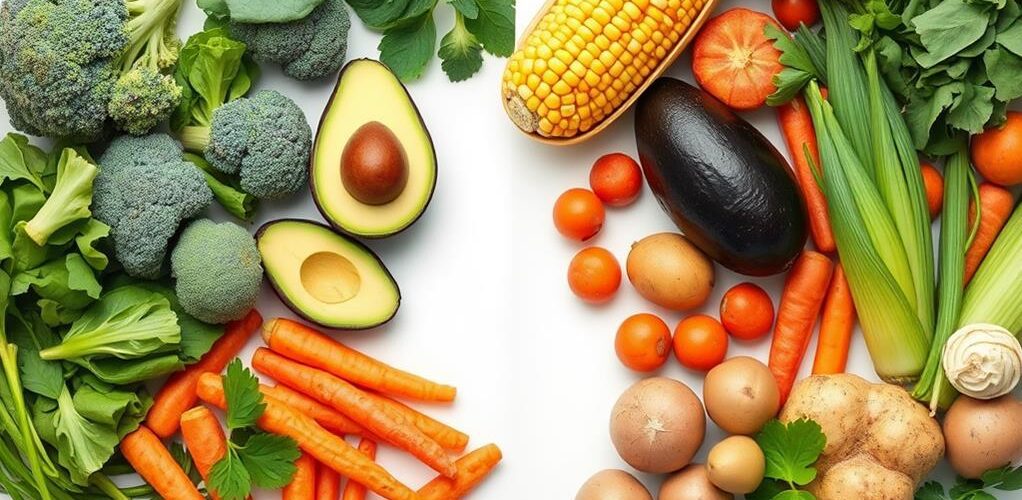
On a keto diet, picking the right veggies is key! You can chow down on non-starchy veggies like spinach, kale, and cauliflower because they're low in carbs and packed with nutrients. But watch out for starchy veggies like potatoes, corn, and peas—they've got way too many carbs. Want some tasty ways to cook? Try steaming, grilling, or even eating them raw to keep all those good-for-you nutrients. Imagine whipping up a yummy meal with roasted Brussels sprouts or a spinach-filled omelet. Curious about more veggie goodness and mouthwatering keto recipes? You're in for a treat!
Key Takeaways
- Non-starchy vegetables like spinach, kale, and broccoli are ideal for maintaining ketosis.
- Avoid starchy vegetables like potatoes, corn, and green peas to stay within keto carb limits.
- Cooking methods such as steaming, roasting, and sautéing are best for preserving nutrients in keto vegetables.
- Keto-friendly vegetables are nutrient-dense, providing essential vitamins and fiber without high carb content.
- Low-carb fruits like raspberries, strawberries, and blackberries can be consumed in moderation on a keto diet.
Key Principles of Keto-Friendly Vegetables
Understanding the key principles of keto-friendly vegetables is essential for anyone adhering to a ketogenic diet. Keto-friendly vegetables, like spinach, kale, and broccoli, are non-starchy and contain less than 8 grams of net carbs per cup. These veggies help keep you in ketosis, a state where your body burns fat for energy instead of carbs. Imagine eating a cup of spinach, which has just 1 gram of carbs—pretty awesome, right?
One of the main keto vegetable benefits is that they are packed with fiber, vitamins, and minerals. This means you get essential nutrients without messing up your low-carb cooking goals. You need to keep your daily carb intake between 20 to 50 grams, so low-carb veggies are your best friends.
Avoid starchy vegetables like potatoes, corn, and peas because they have high carb content that can kick you out of ketosis. For example, a medium-sized white potato has over 33 grams of carbs—yikes!
When cooking these keto-friendly veggies, try steaming, roasting, or sautéing them. These methods keep the nutrients intact and make the vegetables tastier. Plus, you can get creative with spices to make your meals both healthy and delicious.
Nutritional Highlights of Arugula
Arugula, a nutrient-packed leafy green, stands out as an ideal choice for those on a ketogenic diet due to its impressive nutritional profile. With only 3 grams of carbohydrates per 4-cup serving, arugula is perfect for keeping your carb count low. This means you can pile it onto your plate without worrying about breaking your keto streak.
Plus, arugula benefits extend far beyond its low-carb content. This leafy green is surprisingly rich in calcium, offering about 10% of your daily needs in just one serving. Your bones will thank you!
Arugula is also high in vitamins A and C, which are essential for a strong immune system and glowing skin. Packed with antioxidants, it helps your body fight off oxidative stress—a fancy term for the damage caused by free radicals.
And guess what? It's super low in calories, with just 20 calories per 4-cup serving. This makes it a fantastic option for weight management.
Wondering how to include it in your meals? Arugula recipes are versatile and delicious. Toss it in salads, blend it into smoothies, or even use it as a pizza topping. Your taste buds and your body will be equally delighted!
Benefits of Asparagus
Arugula isn't the only powerhouse vegetable for those adhering to a ketogenic diet. Asparagus stands out as a low-carb, nutrient-rich option perfect for keto enthusiasts. With only 2 grams of carbohydrates per four spears, asparagus is an excellent choice for maintaining ketosis while enjoying a delicious vegetable.
Here's why you should consider adding asparagus recipes to your diet:
- Nutrient-Rich: Asparagus is packed with vitamins A, C, E, and K, which are essential for overall health. These vitamins support immune function, skin health, and bone strength.
- Fiber Content: This vegetable is a great source of fiber, aiding digestion and promoting feelings of fullness, which can help manage appetite on a keto diet.
- High in Antioxidants: Asparagus is loaded with antioxidants that combat oxidative stress and may reduce the risk of chronic diseases. This makes it a smart choice for long-term health benefits.
- Mineral-Rich: Asparagus contains important minerals like iron and potassium, which help with healthy bodily functions and maintaining electrolyte balance.
Incorporating asparagus into your meals not only enhances flavor but also boosts your intake of essential nutrients.
Bell Peppers on Keto
Bell peppers are a fantastic choice for anyone following a keto diet, thanks to their low carbohydrate content of just 7 grams per medium pepper.
Packed with vitamin C and antioxidants, they not only support your immune system but also add a burst of flavor and crunch to your meals.
From colorful salads to hearty stuffed peppers, these versatile veggies can fit seamlessly into a variety of keto-friendly recipes.
Nutritional Benefits
Renowned for their vibrant colors and crisp texture, bell peppers are a keto-friendly vegetable that offer substantial nutritional benefits. Available in various bell pepper varieties like red, yellow, and green, each type brings unique nutrient profiles to the table. These colorful veggies are not just eye-catching; they are packed with health-boosting properties.
One major benefit is their rich content of antioxidants, including carotenoids. These antioxidant benefits help combat oxidative stress and may even reduce inflammation.
Plus, bell peppers are an excellent source of vitamin C, with one medium pepper providing more than 100% of the daily recommended intake. This is great for supporting your immune system and keeping your skin healthy.
Here are some key nutritional benefits:
- Vitamin C: More than 100% of the daily recommended intake in one medium pepper.
- Antioxidants: Including carotenoids that help fight oxidative stress.
- Fiber: Contributes to digestive health and promotes feelings of fullness.
- Vitamins A and E: Especially high in red bell peppers, supporting vision and skin health.
Incorporating bell peppers into your keto diet can offer these numerous benefits while keeping your meals colorful and delicious.
Carbohydrate Content
Often included in keto-friendly meal plans, bell peppers provide a balance of flavor and nutrition while maintaining a low carbohydrate content. With approximately 7 grams of carbohydrates in one medium-sized pepper, they are a smart choice for those dedicated to carb counting on a keto diet. The carbohydrate content primarily comes from natural sugars and fiber, yielding a net carb count of about 5 grams per medium pepper after accounting for fiber.
Bell peppers, whether red or green, offer a delicious and colorful addition to any meal. It's worth noting that red bell peppers tend to have slightly higher sugar content due to their ripeness, yet both varieties remain keto-friendly. They are rich in vitamin C and antioxidants, enhancing overall health while keeping carb intake minimal.
Incorporating bell peppers into meals can add flavor, color, and crunch without greatly impacting daily carbohydrate limits. For those enjoying a vegetable variety in their keto diet, bell peppers are a versatile option, blending well with various dishes.
Their unique balance of low carbs and high nutrition makes them an ideal choice for anyone looking to enrich their keto meal plan.
Recipe Ideas
In addition to their nutritional benefits, bell peppers offer a multitude of culinary possibilities on a keto diet. These vibrant veggies, with just 7 grams of carbs per medium pepper, can brighten up any meal while keeping you within your carb limits.
Let's explore some delicious and keto-friendly recipe ideas featuring bell peppers!
1. Bell Pepper Salads: Toss together a revitalizing salad with sliced bell peppers, avocado, and a sprinkle of feta cheese. Add a drizzle of olive oil and a splash of lemon juice for a zesty kick.
This colorful salad is not only low in carbs but also packed with antioxidants to help reduce inflammation.
2. Stuffed Peppers: Fill bell peppers with a mix of ground meat, cheese, and your favorite keto-friendly veggies. Bake them until the peppers are tender and the cheese is melted.
This hearty dish is perfect for dinner and can be customized to suit your taste.
3. Bell Pepper Stir-Fry: Sauté bell peppers with other low-carb veggies like zucchini and broccoli. Add some chicken or tofu for protein and a splash of soy sauce for flavor.
This quick and easy stir-fry makes a great lunch or dinner option.
4. Bell Pepper Nachos: Replace traditional tortilla chips with bell pepper slices. Top with shredded cheese, diced tomatoes, and jalapeños. Bake until the cheese is melted, and enjoy this low-carb twist on a classic snack.
Incorporating these recipes can add variety and color to your keto meals while keeping your carb intake in check!
Broccoli for Ketosis
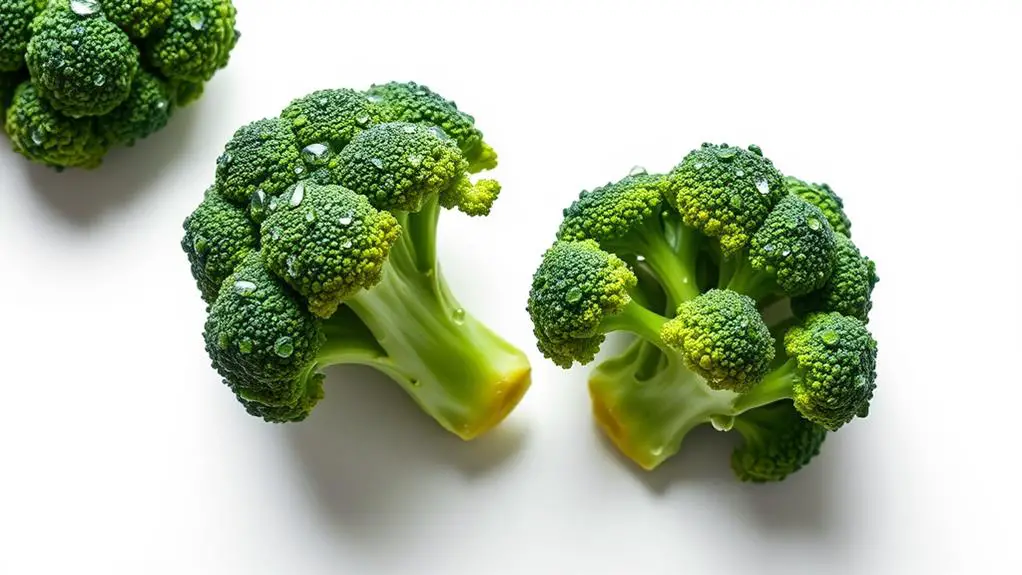
Broccoli is a superstar vegetable for anyone on a keto diet, packing just 8 grams of carbs per medium stalk.
Not only is it low in carbs, but it's also loaded with nutrients like calcium, folic acid, and vitamins A, C, and K, which keep you healthy while staying in ketosis.
You can enjoy this versatile veggie steamed, roasted, or sautéed, making it both delicious and nutritious.
Nutritional Benefits Explained
Embracing the nutritional richness of broccoli can greatly benefit individuals adhering to a ketogenic diet. This low-carb vegetable, containing around 8 grams of carbohydrates per medium stalk, is a powerhouse of essential nutrients that support overall health and wellness.
Broccoli benefits extend far beyond its carbohydrate content, making it an excellent choice for those working to maintain ketosis.
Here are some key advantages:
- Rich in Essential Nutrients: Broccoli is packed with calcium, folic acid, and vitamins A, C, and K. These nutrients are essential for bone health, immune function, and overall vitality.
- High Fiber Content: The fiber in broccoli aids digestion and promotes a feeling of fullness. This can help prevent overeating, a common pitfall on a ketogenic diet.
- Antioxidant Properties: Broccoli is loaded with antioxidants that combat oxidative stress. This reduces the risk of chronic diseases and supports long-term health.
- Nutrient Density: Adding broccoli to meals enhances nutrient intake without greatly increasing carbs, helping to maintain ketosis while boosting overall dietary quality.
Incorporating broccoli into your ketogenic diet is a smart move, providing essential nutrients and supporting your health goals without compromising ketosis.
Cooking Tips Shared
For those on a ketogenic diet, mastering the art of cooking broccoli can transform this nutrient-dense vegetable into a versatile and enjoyable staple. With only 8 grams of carbohydrates per medium stalk, broccoli is a low-carb option that fits seamlessly into a keto lifestyle. Beyond its keto-friendly profile, broccoli boasts a wealth of vitamins A, C, and K, along with fiber and antioxidants, which help support overall health while maintaining ketosis.
One of the best cooking techniques to preserve broccoli benefits is steaming. Steaming keeps the nutrients intact and enhances the vegetable's natural flavors. For a more indulgent option, try roasting broccoli with healthy fats like olive oil. This not only adds a delightful crispiness but also aids in the absorption of fat-soluble vitamins. Stir-fries and salads are also excellent ways to incorporate broccoli into your meals, offering diversity without compromising your carb count.
Here's a quick comparison of broccoli cooking techniques:
| Cooking Method | Nutrient Retention | Flavor Enhancement |
|---|---|---|
| Steaming | High | Moderate |
| Roasting | Moderate | High |
| Stir-frying | Moderate | High |
| Salads | High | Moderate |
Brussels Sprouts: A Keto Choice
Brussels sprouts, a nutrient-dense vegetable, present a compelling option for those adhering to a keto diet. With roughly 8 grams of carbohydrates per cup, Brussels sprouts can be a keto-friendly choice when eaten in moderation.
These little green gems are packed with antioxidants, fiber, and vitamin C, making them not just low in carbs but also high in essential nutrients. The keto benefits of Brussels sprouts are numerous, particularly in promoting digestive health and aiding in satiety, helping you feel full longer.
Here are some key points about incorporating Brussels sprouts into a keto diet:
- Low Carb Count: With only 8 grams of carbs per cup, they fit well into the daily carb limit of a keto diet.
- Nutrient-Rich: High in antioxidants and vitamin C, they help boost overall health.
- High Fiber Content: The fiber in Brussels sprouts promotes good digestion and helps manage appetite.
- Versatile Cooking Methods: Whether roasted, sautéed, or steamed, Brussels sprouts can be prepared in various delicious ways.
Brussels sprouts can be served as a tasty side dish or added to salads, making them a versatile and delicious component of keto meal plans.
Versatile Cauliflower
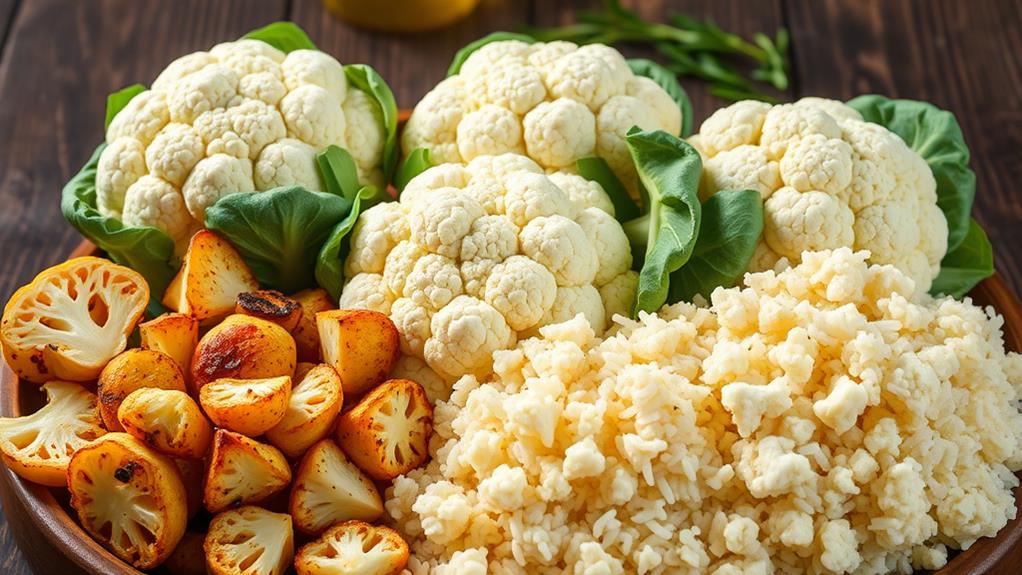
Shifting focus from Brussels sprouts, another exceptional vegetable for a keto diet is cauliflower. Cauliflower is a superstar in the keto world for good reason. With only 4 grams of carbohydrates per cooked cup, it's the perfect low-carb substitute for grains and starchy vegetables. You can whip up all sorts of cauliflower recipes—like cauliflower rice, mashed cauliflower, and even cauliflower pizza crust. Seriously, who knew cauliflower could do so much?
Besides being versatile, the cauliflower benefits are impressive. It's packed with vitamins C and K, antioxidants, and fiber, which means it helps with digestion and fights inflammation. Cauliflower holds onto its nutrients when cooked, whether you're steaming, roasting, or sautéing it. And let's be honest, roasted cauliflower smells amazing!
This veggie's mild taste is like a blank canvas. It soaks up flavors from spices and sauces, making it a flexible ingredient in many keto-friendly dishes.
Imagine biting into a cheesy cauliflower crust pizza or a creamy bowl of mashed cauliflower—delicious and guilt-free. So, if you're looking to add variety and nutrition to your keto meals, cauliflower is definitely the way to go!
Nutrients in Kale
Kale stands out as a nutritional powerhouse in the keto diet, boasting an impressive profile of essential vitamins and minerals. This leafy green is not only low in carbs, with less than 1 gram per cup, but also packed with nutrients that support overall health.
Here are some key kale benefits:
- Vitamins A, C, and K: These vitamins contribute to immune function, skin health, and bone strength. They are essential for maintaining a healthy body and preventing diseases.
- Antioxidants: Kale is rich in antioxidants that help combat oxidative stress and inflammation. This can protect your cells from damage and reduce the risk of chronic diseases.
- Plant-Based Protein: With about 2.5 grams of protein per cup, kale provides a valuable source of plant-based protein, which is essential for muscle repair and growth.
- Minerals: Kale is a good source of calcium and magnesium, supporting muscle function and overall health.
Including kale in your diet is easy with various kale recipes. Whether you blend it into smoothies, toss it in salads, or bake it into crispy chips, kale is a versatile and tasty addition to any keto meal plan.
Mushrooms in Keto Meals
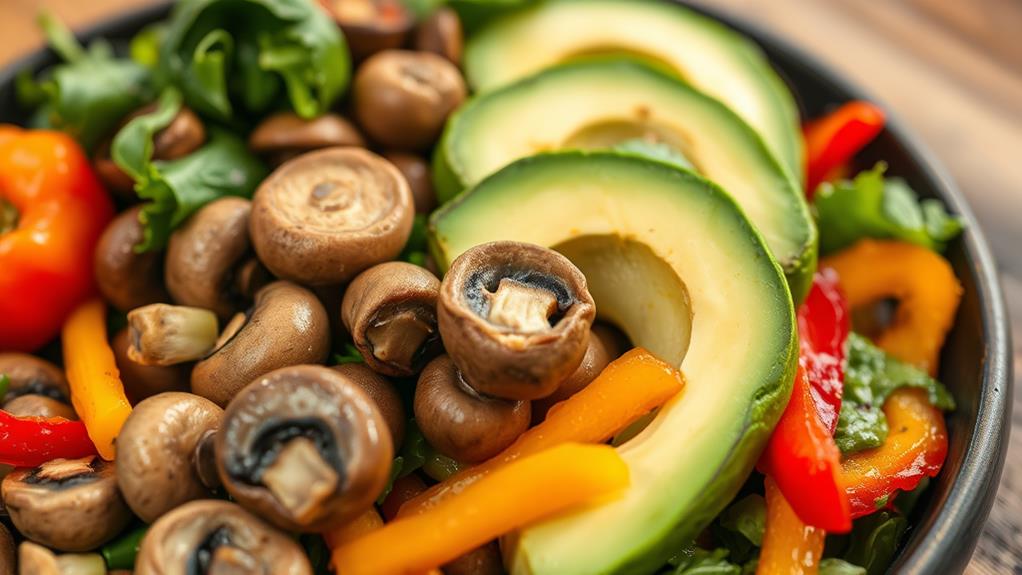
Incorporating mushrooms into your keto meals can be a strategic choice for maintaining low carbohydrate intake while enhancing nutritional value. Mushrooms contain only about 2-3 grams of carbs per 100 grams, making them a great fit for keto diets. Plus, they're packed with B vitamins like riboflavin, niacin, and pantothenic acid, which help your body turn food into energy.
You can use mushrooms in tons of keto-friendly dishes. Think about adding them to stir-fries, omelets, or even as a meat substitute in vegetarian meals. They bring valuable minerals like potassium and selenium to your plate, which are good for your heart and help fight off harmful free radicals.
Here's a quick look at some mushroom varieties and how you can use them in your keto cooking:
| Mushroom Variety | Carbs (per 100g) | Culinary Techniques |
|---|---|---|
| White Button | 2.3g | Sautéing, grilling, stir-frying |
| Portobello | 2.7g | Grilling, stuffing, baking |
| Shiitake | 2.4g | Stir-frying, soups, braising |
| Cremini | 2.3g | Sautéing, roasting, stews |
Incorporating these mushroom varieties into your meals can add flavor and texture while keeping your carb count low. So, get creative in the kitchen and enjoy your keto journey!
Spinach: A Low-Carb Powerhouse
As a nutritional powerhouse, spinach stands out as an exceptional low-carb choice, containing only 1 gram of carbohydrates per cup. This leafy green is packed with essential nutrients like iron, magnesium, and vitamins A and K.
Plus, it's loaded with antioxidants that help reduce oxidative stress and inflammation in the body.
Spinach benefits are numerous, and it's incredibly versatile in the kitchen. Here are four reasons why you should include spinach in your keto diet:
- Low in Carbs: With just 1 gram of carbs per cup, spinach is perfect for keeping your carb intake low.
- Nutrient-Rich: High levels of iron, magnesium, and vitamins A and K make spinach a superfood.
- Antioxidant Power: The antioxidants in spinach can help combat inflammation and oxidative stress.
- Versatile in Recipes: Whether raw in salads, blended into smoothies, or cooked in various dishes, spinach fits seamlessly into many spinach recipes without impacting your carb count.
Incorporating spinach into your meals can also help you feel full longer due to its high fiber content.
Starchy Vegetables to Avoid
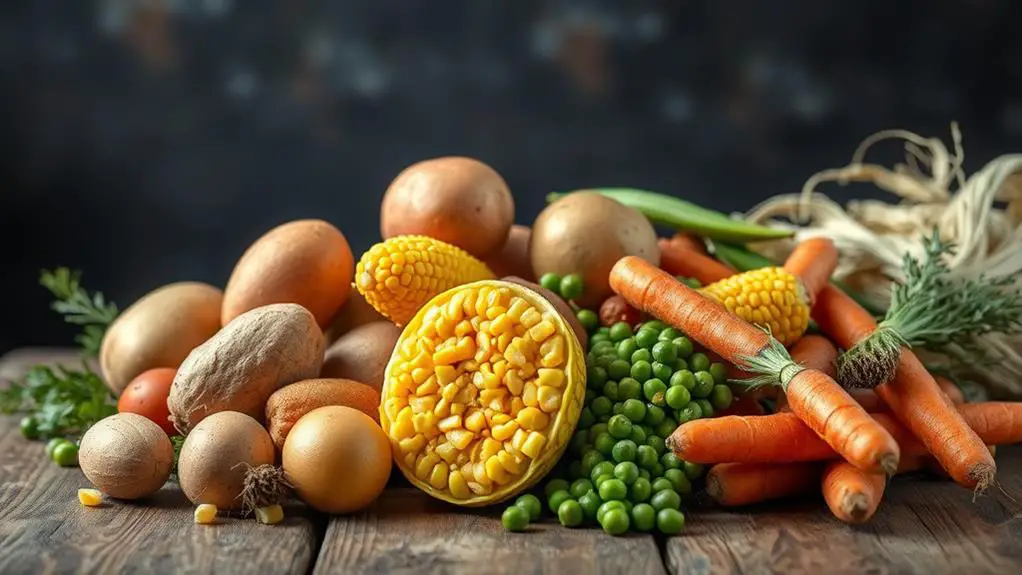
While spinach is an excellent choice for maintaining a low-carb diet, it's equally important to be aware of vegetables that can derail your ketogenic efforts. Starchy vegetables like white potatoes are a prime example, boasting around 33.4 grams of carbohydrates per medium potato. This high carb content can easily kick you out of ketosis, making them a poor fit for keto vegetable combinations.
Corn, while delicious, isn't much better. One medium ear of corn has about 19.1 grams of carbohydrates, making it another high-carb veggie to avoid. Green peas also join this high-carb group, packing 20.9 grams of carbohydrates per cup. Including these in your diet could make it tough to stay within your daily carb limits.
Sweet potatoes, often hailed as a healthier alternative starch source, are also off the keto menu. They contain about 16.82 grams of carbohydrates per 100 grams, which can quickly add up.
Even beets, with their nutritional benefits, aren't ideal. They provide roughly 9.56 grams of carbohydrates per 100 grams, which might hinder your ketosis efforts.
Health Advantages of Keto Vegetables
Ever wondered why keto vegetables are often hailed as the cornerstone of a successful ketogenic diet? The answer lies in their numerous health benefits and positive health impacts. These low-carb powerhouses are packed with essential nutrients that support overall well-being.
First off, keto-friendly vegetables like spinach, which contains only 1 gram of carbohydrates per cup, are perfect for maintaining ketosis. They keep your carb intake low while providing crucial nutrients.
Here are some key keto vegetable benefits:
- Digestive Health: High-fiber veggies, such as broccoli (8 grams of carbs per medium stalk), promote good digestion and help keep you full longer, which can reduce overall calorie intake.
- Antioxidants: Vegetables like bell peppers, with 7 grams of carbs in one medium pepper, are rich in antioxidants. These compounds fight oxidative stress, potentially lowering the risk of chronic diseases.
- Vitamins and Minerals: Non-starchy vegetables, such as kale, deliver essential vitamins A, C, and K, all while containing less than 1 gram of carbohydrates per cup.
- Reduced Inflammation: Regular consumption of keto vegetables has been linked to lower inflammation levels. This supports a balanced immune response, contributing to overall health and wellness.
These benefits make keto vegetables crucial for anyone following a ketogenic diet.
Best Cooking Methods
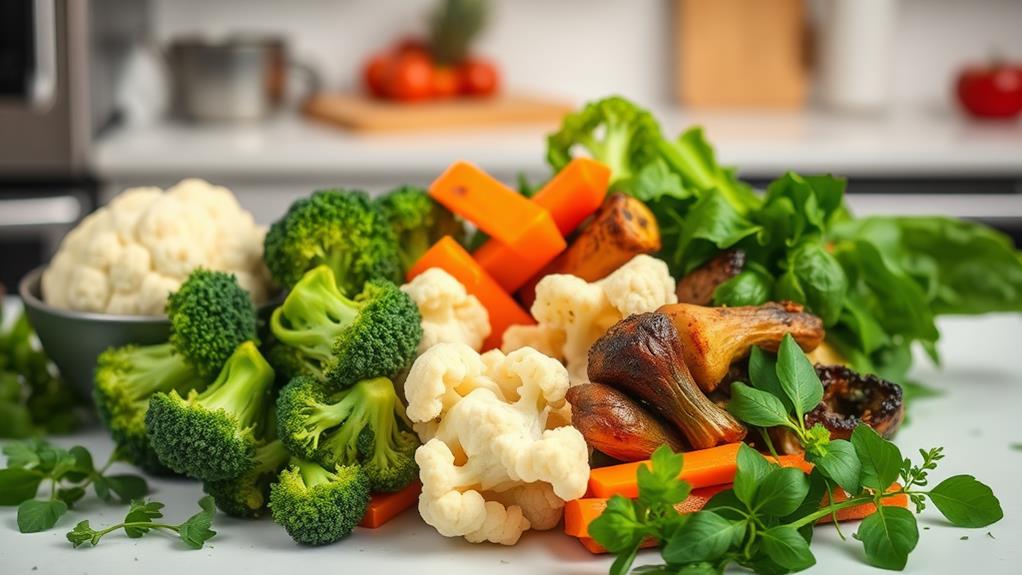
Understanding the health advantages of keto vegetables naturally leads us to contemplate the best ways to prepare these nutritional powerhouses.
Let's explore some top cooking methods that bring out the best in these veggies.
Steaming benefits vegetables like broccoli and asparagus by retaining their nutrients and enhancing flavors without adding extra calories or fat. It's like giving them a spa day!
Next up, roasting times for low-carb favorites like Brussels sprouts and cauliflower can transform them into caramelized, sweet treasures. High temperatures work magic, bringing out rich flavors while keeping their nutritional value intact.
Grilling techniques for bell peppers and zucchini are also fantastic. The smoky flavor achieved without additional calories makes this method both healthy and delicious. It's like a backyard BBQ without the guilt.
Sautéing oils such as olive or avocado oil are perfect for cooking keto veggies. They not only add a delightful texture but also help in absorbing fat-soluble vitamins. A win-win!
Lastly, raw consumption of leafy greens like spinach and kale preserves their enzymes and maximizes nutrient intake. Ideal for salads and smoothies, raw veggies offer a fresh, crunchy experience that's hard to beat.
Keto Meal Ideas
Creating satisfying and nutritious keto meals can be both simple and delicious with the right ingredients. By creatively utilizing low-carb vegetables, you can enhance your meal prep while enjoying a variety of flavors and textures. Here are some keto meal ideas that incorporate vegetable pairings to keep your diet exciting and nutritious.
- Breakfast Omelet: Start your day with a nutrient-dense omelet, incorporating sautéed mushrooms and spinach. Spinach is an excellent choice as it contains only 1 gram of carbohydrates per cup. Add some cheese for extra flavor and protein.
- Refreshing Salad: For lunch or a light dinner, prepare a salad with arugula, bell peppers, and cherry tomatoes. Cherry tomatoes have less than 1 gram of carbohydrates each, making them perfect for a keto-friendly option. Drizzle with olive oil and vinegar for a tangy dressing.
- Cauliflower Rice: Swap out traditional rice for cauliflower rice. Riced and steamed or sautéed cauliflower provides just 4 grams of carbohydrates per cooked cup. Pair it with grilled chicken or tofu for a complete meal.
- roasted Brussels Sprouts: Enjoy roasted Brussels sprouts drizzled with olive oil and seasoned with your favorite herbs. With 8 grams of carbohydrates per cup, they make a flavorful side dish for any meal.
These ideas will help you stay on track with your keto diet while enjoying delicious meals. Happy cooking!
Common Misconceptions
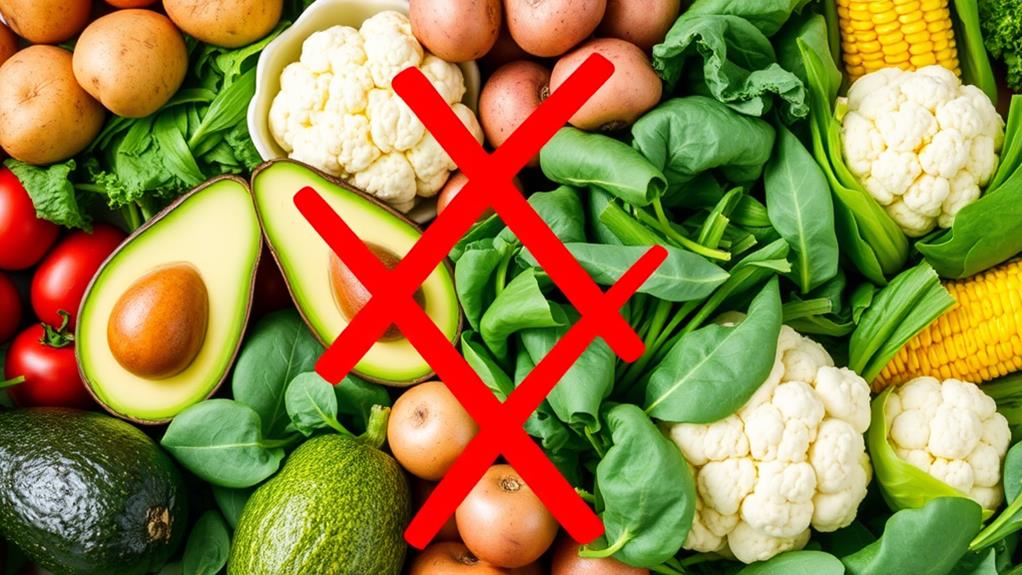
Many people think all vegetables are high in carbs, but that's not true!
While starchy veggies like potatoes should be eaten in moderation, there are plenty of low-carb, nutrient-dense options like spinach and bell peppers that fit perfectly into a keto diet.
Plus, not all leafy greens have the same carb content—arugula and mushrooms are super low-carb, making them great choices too.
Carb Content Myths
A prevalent misconception about the keto diet is that all vegetables are inherently high in carbohydrates, which can deter individuals from incorporating nutrient-rich options into their meals. This carb misconception often leads to unnecessary dietary restrictions and missed opportunities for balanced nutrition.
Let's debunk some common vegetable myths:
- Non-Starchy Vegetables: Contrary to popular belief, not all vegetables are carb-heavy. Non-starchy options like spinach and kale can have less than 1 gram of carbohydrates per cup, making them ideal for keto.
- Root Vegetables: Many think all root vegetables are keto-friendly, but carrots, for instance, contain about 4.1 grams of net carbs per medium carrot. These might not be the best choice for strict keto adherence compared to lower-carb veggies.
- Starchy Vegetables: Starchy vegetables like potatoes and corn should be avoided due to their high carb content (33.4 grams and 19.1 grams per medium serving, respectively). Even peas, often underestimated, pack 20.9 grams per cup.
- Fruits on Keto: There's a belief that all fruits are off-limits on keto. However, moderate consumption of low-carb fruits like raspberries (1.7 grams net carbs per ¼ cup) can fit within daily carb limits.
Nutrient Density Importance
Understanding the importance of nutrient density is vital for those adhering to a ketogenic diet. Nutrient density refers to the ratio of essential nutrients to the number of calories in a food, which is significant when calorie intake is limited. Many people mistakenly believe that all vegetables are high in carbs, but this isn't true. Non-starchy vegetables like spinach, kale, broccoli, and cauliflower are low in carbs yet packed with vitamins A, C, and K, along with fiber and antioxidants.
When choosing vegetables on a keto diet, it's essential to focus on nutrient-dense options to maintain dietary balance and avoid deficiencies. For instance, while starchy vegetables like potatoes are best avoided, nutrient-dense choices such as bell peppers and Brussels sprouts are excellent additions. These vegetables provide essential nutrients without disrupting ketosis.
Here's a quick comparison of some keto-friendly veggies:
| Vegetable | Nutrient Highlights |
|---|---|
| Spinach | High in vitamins A, C, and K |
| Kale | Rich in antioxidants and fiber |
| Broccoli | Packed with vitamin C and fiber |
| Cauliflower | Low in carbs, high in vitamin C |
| Bell Peppers | Excellent source of vitamin C |
Starch Misunderstandings
Despite the clear benefits of nutrient-dense, low-carb vegetables on a ketogenic diet, several misconceptions about starch content persist.
Many people think all vegetables are high in carbs and should be avoided. This carb confusion often leads to unnecessary restrictions and missed opportunities for a balanced diet.
Here are four common misunderstandings about starchy vegetables and carbs:
- All Vegetables Are High in Carbs: Not true! While starchy vegetables like potatoes and corn are carb-heavy, non-starchy options like spinach and arugula are low in carbs and great for keto.
- You Must Avoid All Vegetables on Keto: False. You can enjoy many nutrient-dense, low-carb vegetables that support your health and ketosis. Broccoli and cauliflower, for example, are packed with vitamins and minerals.
- Starchy Vegetables Can't Be Eaten at All: Incorrect. While it's wise to limit them, you can still have starchy vegetables in moderation. Just keep your daily carb intake between 20-50 grams to stay in ketosis.
- Carb Content is All That Matters: Wrong. Nutrient density is vital. Even low-carb vegetables like spinach and broccoli are full of essential nutrients you need.
Frequently Asked Questions
Which Vegetables Should I Avoid on Keto?
To maintain ketosis, avoid starchy vegetables like potatoes, corn, green peas, beets, and sweet potatoes. Opt for keto-friendly alternatives such as leafy greens, broccoli, and cauliflower, which are ideal for low carb recipes.
What Vegetables Are on the Keto List?
Keto-friendly greens such as spinach, kale, and mushrooms are excellent choices. Low-carb cruciferous vegetables like broccoli, Brussels sprouts, and cauliflower also fit well within a keto diet, providing essential nutrients while maintaining low carbohydrate intake.
Should You Avoid Carrots on Keto?
While carrots can be included in a keto diet in moderation due to their higher carbohydrate content, it is advisable to opt for keto alternatives like cauliflower or zucchini to better manage overall carb intake and maintain ketosis.
What Vegetables Are High in Carbs to Avoid?
Vegetables high in carbs to avoid on a keto diet include white potatoes, corn, green peas, sweet potatoes, and beets. Their high carb content makes them unsuitable keto vegetables for maintaining a state of ketosis.
Conclusion
In summary, keto-friendly vegetables play an essential role in maintaining ketosis while providing vital nutrients. Vegetables like arugula, asparagus, bell peppers, and broccoli offer various health benefits and can be prepared in numerous ways to enhance keto meals. By understanding which vegetables to include and which to avoid, individuals can optimize their ketogenic diet for better health outcomes. Emphasizing diverse preparation methods guarantees both nutritional value and enjoyment in a keto lifestyle.
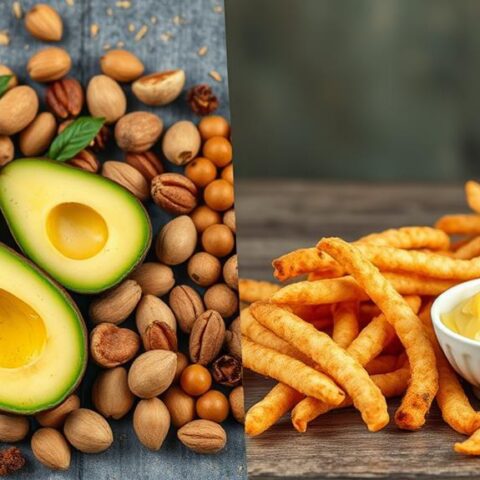

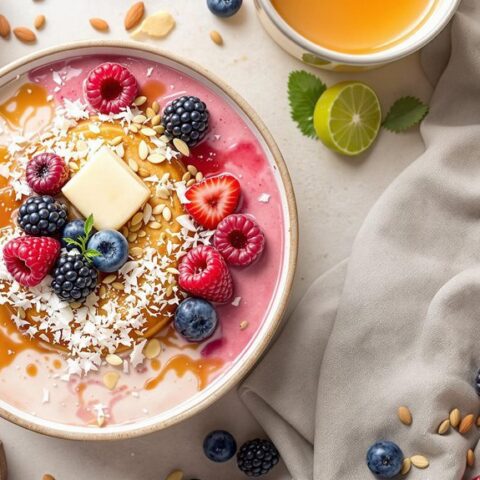






No Comments